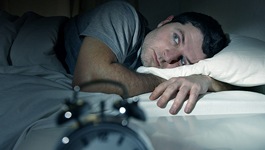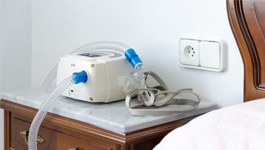Sleep Apnea Treatment Wakefield
For a Comfortable and
Uninterrupted Sleep
 Sleep is something that everyone needs, but we often take it for granted. Restless nights can leave you unproductive and unfocused the next day, which can affect you both personally and professionally. If you’re struggling with chronic snoring and lack of sleep, you may have sleep apnea. This sleeping disorder affects over 10 million people, and it’s estimated that 80% of its cases are undiagnosed. So, how do you know if you have it and what can you do to help? Thankfully, Dr. Rob Schumacher is an expert at identifying this sleeping disorder, and he is experienced in providing sleep apnea treatment in Wakefield.
Sleep is something that everyone needs, but we often take it for granted. Restless nights can leave you unproductive and unfocused the next day, which can affect you both personally and professionally. If you’re struggling with chronic snoring and lack of sleep, you may have sleep apnea. This sleeping disorder affects over 10 million people, and it’s estimated that 80% of its cases are undiagnosed. So, how do you know if you have it and what can you do to help? Thankfully, Dr. Rob Schumacher is an expert at identifying this sleeping disorder, and he is experienced in providing sleep apnea treatment in Wakefield.
What Is Sleep Apnea?

Sleep apnea is a condition in which the patient stops breathing for 10 seconds or longer during sleep. While there are different types of sleep apnea, one of the most common is obstructive sleep apnea syndrome (OSAS). In many cases, the contributing factor in OSAS is blockage in the airway from the tongue or lower jaw.
Why Is Sleep Apnea Dangerous?

The cycle of sleeping and waking caused by sleep apnea leads to a range of serious issues from daytime drowsiness and moodiness, to difficulty concentrating and memory loss. Sleep apnea patients face an increased risk of high blood pressure and accidents at work, at home, or behind the wheel.
What Are the Signs and Symptoms of Sleep Apnea?
Because the majority of OSAS cases are undiagnosed, it’s important for you or your partner to recognize the most common signs and symptoms of this sleeping disorder:
- Loud snoring
- Inconsistent breathing during sleep
- Awakening with a dry mouth
- Gasping for air during sleep
- Headaches in the morning
- Difficulty staying asleep
- Daytime drowsiness
- Moodiness and lack of sex drive
If you, your partner, or a family member notices any of these symptoms, you should contact Dr. Schumacher right away. He will be able to properly diagnose your sleep apnea and provide the treatment that you need for a better night’s sleep.
Sleep Apnea Treatment
 There are 2 main types of treatment for sleep apnea:
There are 2 main types of treatment for sleep apnea:
CPAP Machine
In the past, a CPAP (continuous positive airway pressure) machine was the solution for OSAS. CPAP machines use nasal masks and steady streams of air to keep airways open during sleep. Many patients experienced side effects with CPAP that aren’t ideal for sleeping.
Oral Appliance
That’s why the most popular form of treatment is oral appliance therapy. Your appliance is custom-made to reposition your tongue or lower jaw. As a result, air reaches the lungs without being cut off. Oral appliance therapy also helps patients who struggle with snoring. In fact, snoring and sleep apnea often go hand-in-hand. A patient who struggles with severe snoring may have an undiagnosed case of sleep apnea and should consider seeking treatment. Oral appliances position your jaw and tongue in a way that promotes sleep and helps prevent snoring.
Call our dental office in Wakefield to learn more about sleep apnea and your treatment options. We are ready to answer any questions you may have and look forward to helping you get the sleep that you need.
Understanding the Cost of Sleep Apnea Treatment

The cost of sleep apnea treatment depends on the specifics of your care plan. When you visit us for an airway consultation, we will be able to have a detailed discussion about the monetary aspect of your treatment. Most patients are pleasantly surprised to find out how affordable treatment is; with the help of insurance and/or financing, you may have to pay very little upfront. Continue reading below to learn more about the cost of sleep apnea therapy:
Does Dental Insurance Cover the Cost of Sleep Apnea Treatment?

No, dental insurance does not cover sleep apnea treatment. Its purpose is to help patients achieve healthy teeth and gums; it is not geared toward airway treatments. The good news is that sleep apnea services are very often covered by medical insurance. Our team can help you coordinate with your insurer so you will not have any unpleasant surprises when the time comes to pay for your treatment.
Factors That Affect the Cost of Sleep Apnea Treatment

There are two huge factors that can influence the cost of your sleep apnea care:
- Your insurance coverage. Health insurance usually covers both sleep apnea diagnostic services and In order to make sure you receive all the benefits you are entitled to, it will be important to file all the necessary forms and/or get preapproval for certain services.
- The type of treatment you receive. A CPAP machine may have a very different price than a custom oral appliance. The good news is that both options are usually at least partially covered by insurance.
Treat Your Sleep Apnea Now to Improve Your Health

Some patients may hesitate to receive necessary care due to concerns about cost. That is understandable, but we encourage you to consider the long-term financial implications of any choice you make.
Sleep apnea is associated with a heightened risk of numerous health complications, including mental health issues, heart disease, diabetes, unwanted weight gain, dementia, acid reflux, and more. By protecting your health via effective sleep apnea treatment, you can protect your quality of life and potentially avoid high medical bills in the future.
Sleep apnea also increases your risk of being in a motor vehicle accident; treatment may prevent injuries and spare you from expensive car repairs.
Making Sleep Apnea Treatment More Affordable
Our team does not want you to be stressed about the financial side of your treatment. Give us a call to learn how we can help you maximize your insurance benefits. You may also qualify for affordable financing through a third-party company. We can walk you through the application process. Most patients are deemed eligible for a low-interest payment plan!
Sleep Apnea FAQs

Are you sick of waking up in the morning even more exhausted than you were the night before? Then we invite you to contact us to learn more about whether you could benefit from sleep apnea treatment. While you wait for your appointment, we encourage you to read through this list of frequently asked questions and their answers.
How Much Does Sleep Apnea Treatment Cost?
The cost of your oral appliance will depend on factors such as the severity of your apnea, the type of appliance you need, and your level of insurance coverage. At Schumacher Dental, we can easily handle all of the insurance paperwork on your behalf so that you can just sit back and enjoy the savings!
Keep in mind that even if the cost seems a bit high, it’s an investment worth making. Not only will you be achieving the restful sleep you need and deserve, but you’ll also greatly reduce your risk of traffic accidents due to drowsy driving as well as related medical conditions.
What Happens If I Don’t Treat My Sleep Apnea?
In addition to being exhausted all the time, the frequent cycle of sleeping and waking up throughout the night can increase your risk for several health problems, including:
- High blood pressure
- Cardiovascular disease
- Type 2 diabetes
- Acid reflux
- Depression
- Anxiety
- Adult asthma
To stay as healthy as possible, we can’t stress enough that you should seek treatment right away if you suspect that you have sleep apnea.
How Long Will My Oral Appliance Last?
As long as you don’t grind your teeth or clench your jaw while sleeping, then you can trust your appliance to last for many years. Even if you do clench and grind, though, the device can still last for years. You even get the added benefit of protecting your teeth from damage. However, your appliance may need to be adjusted every year or so to make sure it still fits well and remains in good condition.
Will I Have to Wear My Oral Appliance Forever?
Not necessarily. There may be ways to overcome your sleep apnea, such as losing weight, avoiding alcohol before bedtime, and changing your sleeping position. The right solutions can vary from patient to patient. During your consultation, we can go over your medical history and lifestyle to come up with a personalized action plan to conquer your sleep apnea. Of course, in order to monitor your progress, regular follow-up appointments will be necessary.
